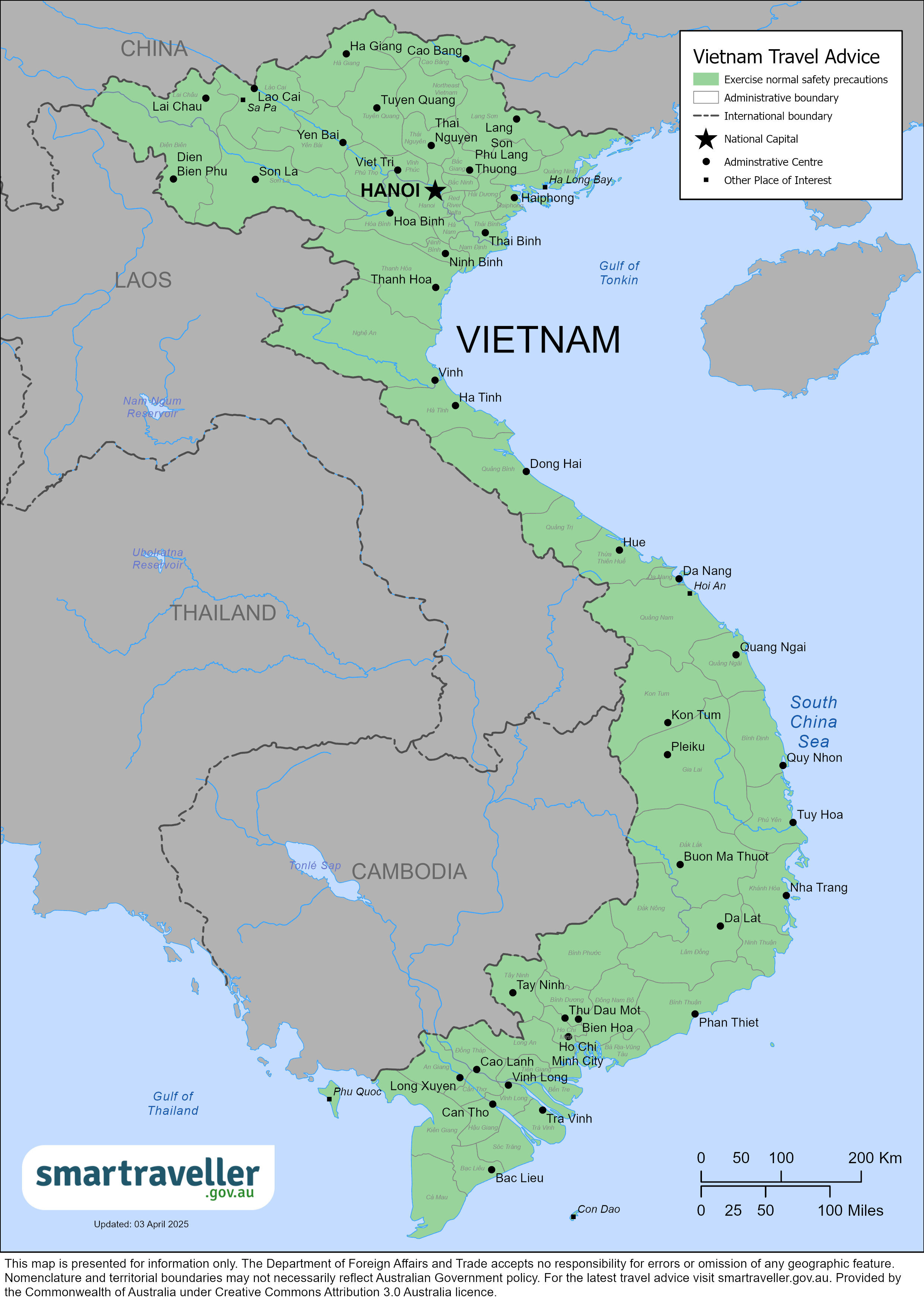Travel is restricted:
- in some parts of the central Highlands
- around some border areas
- near military installations
Long Tan Cross site
The Vietnamese Government won't permit official Long Tan commemorations at the Long Tan Cross site in Ba Ria-Vung Tau Province.
Access to the site will remain open to small groups of people for private visits without media coverage. This may change at short notice.
Visitors to the site may not:
- wear medals or uniforms
- carry banners or flags
You must behave in a solemn manner, respecting the wishes of local communities.
Landmines and explosive remnants of war
Unexploded ordinance and landmines are a danger in former battlefields, especially in central Vietnam and along the Laos border.
Mine-free roads and paths are well-marked.
If you visit former battlefields, stay on marked pathways.
Driving permit
You must have a valid Vietnamese driver's licence to drive or ride in Vietnam. This includes for motorcycles of 50cc or more.
An International Driving Permit (IDP) issued in Australia is not recognised in Vietnam.
Authorities may fine you for driving without a valid licence.
Your travel insurer will likely deny any claims you make if:
- You're unlicensed and/or
- You don't hold the correct class of licence.
More information:
Road travel
You're more likely to die in a motor vehicle accident in Vietnam than in Australia.
Hazards include:
- crowded streets in major cities
- drivers ignoring road rules
- poor vehicle and road maintenance
Traffic accidents often happen and attract large crowds.
If you're involved in an accident, you could face criminal charges. This is regardless of who's at fault. You may need to pay a large sum to the injured person or their family.
If you're not familiar with local conditions, avoid driving or riding a motorcycle.
Whether driving, riding or walking, be very careful when crossing busy streets. Traffic can appear from any direction.
More information:
Motorcycles
The number of travellers involved in serious motorcycle accidents is increasing.
Check your travel insurance policy covers you when travelling by motorcycle.
Always wear a helmet that meets Australian safety standards.
Only ride motorcycles if you're:
- properly licensed (Australian driver licences or International Driver Licences issued in Australia are not accepted in Vietnam; you must hold a Vietnamese driving licence to ride a motorbike 50cc or above); and
- familiar with and comfortable in local driving conditions
Taxis
Be careful using taxis hailed on the street.
Major metered taxis are generally reliable. Ensure the taxi driver knows how to get to where you're going before you get in.
Check the meter is used. Leave the taxi if the driver tries to pick other passengers up.
If you book a taxi online or through an app, make sure the details of the vehicle and driver match those the company gives you.
Unless using an Australian safety standard-approved helmet, we discourage using motorcycle taxis as they provide riders with helmets that offer little to no protection against injury in the case of an accident.
Be careful of taxi scams. See Safety.
Public transport
Inter-city buses have a high accident rate.
Petty theft often happens on buses. See Safety.
When travelling by rail, keep the ticket stub as you need it when leaving the train station.
More information:
Sea travel
Boats, hydrofoils and ferries may not meet Australian safety standards.
Accidents on waterways happen. Vessels have sunk and people have died. This includes in Ha Long Bay.
Whenever you plan to travel by boat:
- ask tour operators about the safety record and emergency procedures
- make sure there is enough safety equipment such as life jackets on board
- if proper equipment is not available, use another provider
Piracy happens in coastal areas of Vietnam.
More information:
Air travel
You may need to show your luggage tags when leaving a Vietnamese airport. Keep your luggage receipt from your airline on you at all times.
By law, children under 14 years travelling alone on domestic flights must:
- bring a birth certificate
- have an authorisation letter between the legal guardian of the child and the airline confirming the child can travel alone
Contact the airline in advance to check what is needed for unaccompanied minors.
DFAT doesn’t provide information on the safety of individual commercial airlines or flight paths.
Check Vietnam's air safety profile with the Aviation Safety Network.
More information:



